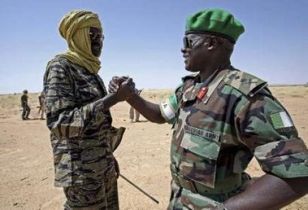UN, US urge rebels withdrawal from Darfur prize town
February 2, 2009 (ADDIS ABABA) – In the wake of a Sudan government warning against UN-African Union peacekeepers, UN Secretary-General Ban Ki-Moon today and the US Administration urged rebels to give up a major town seized mid-January at a key crossroads in South Darfur.
 “I have urged the JEM to withdraw from Muhageria in order to avoid an escalation of violence, and the Sudanese authorities to use maximum restraint,” said the UN secretary-general in an address to the Summit Meeting of the African Union in Addis Ababa on Monday.
“I have urged the JEM to withdraw from Muhageria in order to avoid an escalation of violence, and the Sudanese authorities to use maximum restraint,” said the UN secretary-general in an address to the Summit Meeting of the African Union in Addis Ababa on Monday.
The US State Department joined in condemning the rebel capture of the town and encouraged the Justice and Equality Movement (JEM) to withdraw from Muhageria, which is a town of some 30,000 inhabitants, located 80 km (50 miles) east of Nyala, the capital of South Darfur.
While JEM has vowed to fiercely defend the beleaguered prize, the joint UN-African Union peacekeeping mission (UNAMID) expressed fears that government counter-attacks against the area, which include nightly bombing runs, endanger the 196 peacekeepers in the town and civilians.
A statement from the peacekeepers today estimated that 5,000 civilians have gathered around the base in fear, for the second time since the town was seized, while aerial bombardments and frequent movement of “unidentified aircraft” continued over Muhageria town. Furthermore, two persons were reported injured during an explosion that occurred earlier during the day and were taken to a hospital in Muhageria, said UNAMID.
Sudan’s government on Sunday asked the peacekeepers to leave Muhageria, as officials declared that the army intends to storm the town. On the sidelines of summit in Addis Ababa, the deputy leader of Sudan’s ruling party, Nafi Ali Nafi, disclosed today to reporters that Sudanese troops will attack JEM.
Rebel spokesmen said Sunday that government forces, including tanks, were advancing on the area from three directions, but noted that their own forces were based outside the residential areas.
UNAMID TO REMAIN IN MUHAGERIA
Despite preliminary reports that UNAMID was preparing to evacuate Muhageria, the peacekeeping mission clarified today that it will remain at its base there. Spokesperson Noureddine Mezni denied that Sudan had demanded UNAMID to leave the disputed location, calling the message from Khartoum “not an ultimatum, but a warning” for the safety of its personnel.
The peacekeeping mission stated that it had initiated “diplomatic and political consultations, at the highest levels” aimed at preserving the presence of peacekeepers in the town in order to protect civilians. Rodolphe Adada, the mission’s Joint Special Representative, discussed the situation with Sudan’s undersecretary of foreign affairs, Mutrif Siddiq, today in Khartoum, but after the meeting Siddiq reiterated to reporters that the government was committed to retaking the area by force.
Adada will also travel to neighboring Chad to discuss the issue with representatives of JEM, according to UNAMID.
The military commander of UNAMID, Gen. Martin Agwai, admitted last year that his forces could run into trouble if drawn into a heavy engagement. Full deployment of the peacekeeping force is delayed and the UN chief reiterated today that it still lacks 18 utility helicopters, which no nation has been willing to contribute.
REBELS REJECT RETREAT OPTION
JEM Spokesman Ahmed Hussein Adam, speaking by phone from London, said that JEM is ready to cooperate with the peacekeeping force, but rejected any request to withdraw their troops from Muhageria.
Last month, Adam told Sudan Tribune that Muhageriya had been jointly registered to JEM under the old AMIS peacekeeping mission, adding likewise today that Darfur is their land and they have the freedom to move anywhere.
“There is nothing that gives Khartoum the right to control the town and denies JEM from that,” he said, noting also that they expect the attack of the Sudanese army at any time.
Adam welcomed the coming meeting with Joint Representative Adada, noting that UNAMID intends to discuss the establishment of “safe zones” in Darfur to protect civilians and to ensure the arrival of the humanitarian aid to the civilians. He added that this meeting will provide the opportunity to study the institutionalization of joint cooperation in this field.
(ST)
